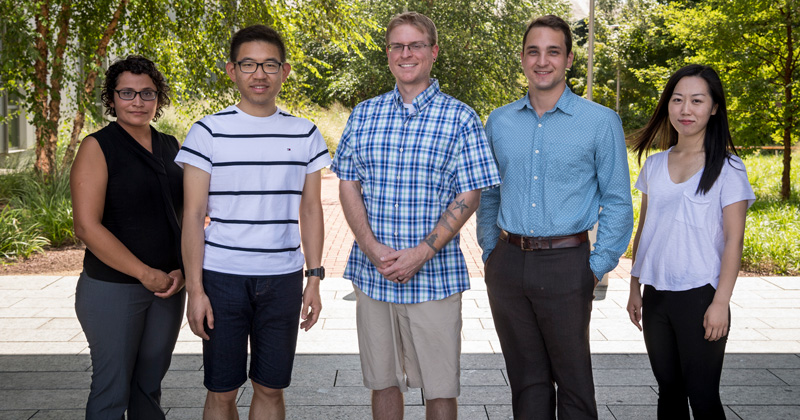


Bridging science and society
Photo by Kathy Atkinson October 03, 2018
Five doctoral students selected for 2018 DENIN Environmental Fellowships
The Delaware Environmental Institute (DENIN) has selected its fifth class of DENIN Environmental Fellows. These highly competitive and prestigious fellowships offer financial support and professional development opportunities to graduate students at the University of Delaware.
The two-year fellowships support doctoral students whose research interests demonstrate a bridge between science and society. Five recipients were chosen following a rigorous selection process that included a written research proposal and an interview for finalists. Candidates were expected to demonstrate an ability and commitment to communicating and transferring the benefits of their research to the wider world in addition to the intellectual merit of their research proposals.
Two of this year’s fellowships are supported by a grant from the Unidel Foundation that focuses on building UD’s capacity in biogeosciences, an interdisciplinary field of science that studies the interaction between geological and biological processes. Additional support for the Environmental Fellows program is provided by private philanthropy and directly by DENIN.
The DENIN Fellows for 2018–20 include the following students:
Anders Kiledal earned his bachelor’s degree in biology from Hillsdale College. He is a student in the molecular biology and genetics program of the Department of Biological Sciences and conducts research on the concrete microbiome. His work focuses on the bacteria in concrete and their potential as bio-indicators of a chemical reaction that causes premature concrete degradation. This work could allow for better monitoring of concrete structures, damage mitigation, and increased knowledge of a structure's “health.” He is currently working with Julia Maresca, associate professor of civil and environmental engineering.
Xiangmin Liang earned his bachelor’s degree in environmental engineering from Huazhong University of Science and Technology and a master’s degree from Illinois Institute of Technology. Working with Daniel Cha, professor of civil and environmental engineering, Liang’s research focuses on developing composite materials that are derived entirely from microorganisms growing naturally in wastewater treatment plants. He is evaluating the potential for using filamentous microbes as reinforcement and polymer-accumulating microbes as matrix for composites. Central goals of the research are to produce sustainable materials based on biorenewable resources while reducing waste biomass production.
Alma Vázquez-Lule earned her bachelor’s degree in biology from the National Autonomous University of Mexico and a master’s degree in geomatics from the Research Center of Geography and Geomatics in Mexico. Working with Rodrigo Vargas, associate professor of plant and soil sciences, Vázquez-Lule’s research focuses on the carbon cycle in coastal wetlands. These ecosystems can store large amounts of carbon that can mitigate the effect of increasing atmospheric carbon dioxide caused by human activities. She measures how much carbon, in the form of carbon dioxide and methane, is captured and emitted annually at the ecosystem scale by salt marshes of Delaware. Her work has applications for carbon markets and valuing ecosystem services.
Eric Moore earned his bachelor’s degree in biology and master’s in ecology and evolution from the University of Louisville. He is working with Tara Trammel, the John Bartram Assistant Professor of Urban Forestry in the Department of Plant and Soil Sciences. His work focuses on nonnative invasive plants and urbanization-related habitat disturbances, two of the most well-recognized threats to biodiversity in terrestrial ecosystems worldwide. Moore’s research includes an experiment designed to reduce secondary invasion of nonnative plants, promote native species diversity, and slow nitrogen cycling rates and losses within the soil following invasive plant removals. The work will help inform forest management practices and strategies for forest restoration.
Danhui Xin earned her bachelor's and master's degrees in environmental engineering from Tongji University in Shanghai. She is working with Pei Chiu, professor of civil and environmental engineering, and her research is focused on biochar, a carbon-rich product derived from organic wastes from agriculture or the timber industry. Biochar has been suggested as a means of sequestering carbon and improving soil fertility. Xin’s research expands our understanding of biochar’s electron transfer and storage properties and explores their potential applications in drinking water disinfection, irrigation and storm water treatment, and soil remediation.
More information about the DENIN Environmental Fellows program is available on the program webpage, including profiles of past recipients, information for prospective donors who wish to support the program and application information in the late spring.
About DENIN
The Delaware Environmental Institute (DENIN), founded at the University of Delaware in 2009, is an interdisciplinary incubator of research, knowledge and solutions specifically dedicated to safeguarding the environment and addressing environmental issues. DENIN provides academic, government and industrial partners broad access to experts from multiple disciplines in a collaborative effort to advance environmental science, promote environmental education and devise innovative, multidimensional strategies for environmental sustainability.
Contact Us
Have a UDaily story idea?
Contact us at ocm@udel.edu
Members of the press
Contact us at 302-831-NEWS or visit the Media Relations website

